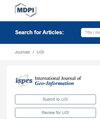Analysis of the Impact of the Digital Economy on Carbon Emission Reduction and Its Spatial Spillover Effect—The Case of Eastern Coastal Cities in China
IF 2.8
3区 地球科学
Q2 COMPUTER SCIENCE, INFORMATION SYSTEMS
引用次数: 0
Abstract
The expansion of the digital economy is crucial for halting climate change, as carbon emissions from urban energy use contribute significantly to global warming. This study uses the Difference-in-Differences Model and the Spatial Durbin Model determine whether the digital economy may support the development of reducing carbon emissions and its geographic spillover effects in Chinese cities on the east coast. In addition, it looks more closely at the effects of lowering carbon emissions in space by separating them into direct, indirect, and spatial impact parts. The findings show that (1) from 2012 to 2021, the digital economy favored carbon emission reductions in China’s eastern coastline cities, as supported by the robustness test. (2) The link between digital economy growth and carbon emissions is highly variable, with smart city development and urban agglomeration expansion both cutting city carbon emissions considerably. Successful digital economy strategies can lower CO2 emissions from nearby cities. (3) Eastern coastal cities have a considerable spatial spillover impact, and the digital economy mitigates local energy consumption and carbon emissions while simultaneously enhancing environmental quality in nearby urban areas. This analysis proposes that the peak carbon and carbon neutrality targets can be met by increasing the digital economy and enhancing regional environmental governance cooperation.数字经济对碳减排的影响及其空间溢出效应分析--以中国东部沿海城市为例
城市能源使用产生的碳排放严重加剧了全球变暖,因此数字经济的发展对遏制气候变化至关重要。本研究利用差分模型和空间杜宾模型来确定数字经济是否可以支持中国东部沿海城市减少碳排放的发展及其地理溢出效应。此外,通过将碳排放分为直接影响、间接影响和空间影响三个部分,更深入地研究了降低碳排放在空间上的影响。研究结果表明:(1)从 2012 年到 2021 年,数字经济有利于中国东部沿海城市的碳减排,这一点得到了稳健性检验的支持。(2)数字经济增长与碳排放之间的联系变化很大,智慧城市发展和城市群扩张都能大幅减少城市碳排放。成功的数字经济战略可以降低附近城市的二氧化碳排放量。(3) 东部沿海城市具有相当大的空间溢出效应,数字经济在缓解当地能源消耗和碳排放的同时,也提升了附近城市地区的环境质量。本分析提出,可以通过提高数字经济水平和加强区域环境治理合作来实现碳峰值和碳中和目标。
本文章由计算机程序翻译,如有差异,请以英文原文为准。
求助全文
约1分钟内获得全文
求助全文
来源期刊

ISPRS International Journal of Geo-Information
GEOGRAPHY, PHYSICALREMOTE SENSING&nb-REMOTE SENSING
CiteScore
6.90
自引率
11.80%
发文量
520
审稿时长
19.87 days
期刊介绍:
ISPRS International Journal of Geo-Information (ISSN 2220-9964) provides an advanced forum for the science and technology of geographic information. ISPRS International Journal of Geo-Information publishes regular research papers, reviews and communications. Our aim is to encourage scientists to publish their experimental and theoretical results in as much detail as possible. There is no restriction on the length of the papers. The full experimental details must be provided so that the results can be reproduced.
The 2018 IJGI Outstanding Reviewer Award has been launched! This award acknowledge those who have generously dedicated their time to review manuscripts submitted to IJGI. See full details at http://www.mdpi.com/journal/ijgi/awards.
 求助内容:
求助内容: 应助结果提醒方式:
应助结果提醒方式:


